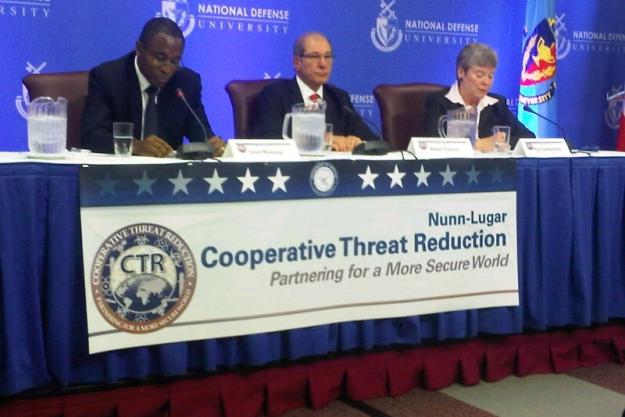
Director-General Ahmet Üzümcü participated with senior U.S. officials and academicians in a symposium on 3 December 2012 entitled “Nunn-Lugar Cooperative Threat Reduction (CTR): Partnering for a More Secure World”. The symposium was held in conjunction with the 20th anniversary of the CTR programme at the National Defense University in Washington D.C and featured an address by U.S. President Barack Obama.
The Director-General took part in a panel discussion on “CTR in the International Context” with Dr David Mukanga, Executive Director of the African Field Epidemiology Network, which was moderated by the Honorable Rose Gottemoeller, U.S. Acting Under Secretary for Arms Control and International Security. The agenda of the symposium [PDF – 87 KB] also included a discussion with Senators Richard Lugar and Sam Nunn, inter alia, and welcoming remarks by the Honorable Leon Panetta, the U.S. Secretary of Defense.
In his remarks [PDF – 20 KB], Director-General Üzümcü expressed his appreciation for being invited to share a forum with so many leaders on the 20th anniversary of the CTR, which he said “complemented significantly” the chemical demilitarization efforts of the OPCW.
The Director-General stated that chemical weapons have been used more often than any other weapon of mass destruction: in a global conflict, in regional wars, and as weapons of terror. He added that the existence today of a near universal norm – established and supported collectively by the international community, as embodied in the Chemical Weapons Convention – has been “the single most important factor in making our present world safer from the threat of chemical weapons.”
The Director-General noted that the OPCW has now overseen the destruction of 78% of all declared global stockpiles of chemical weapons, and emphasized two points about this historic achievement: first, the possibilities it demonstrates that can be realized within a multilateral framework viewed as beneficial for all, and second, the constant awareness that a well-deserved sense of accomplishment must not lead to complacency.
